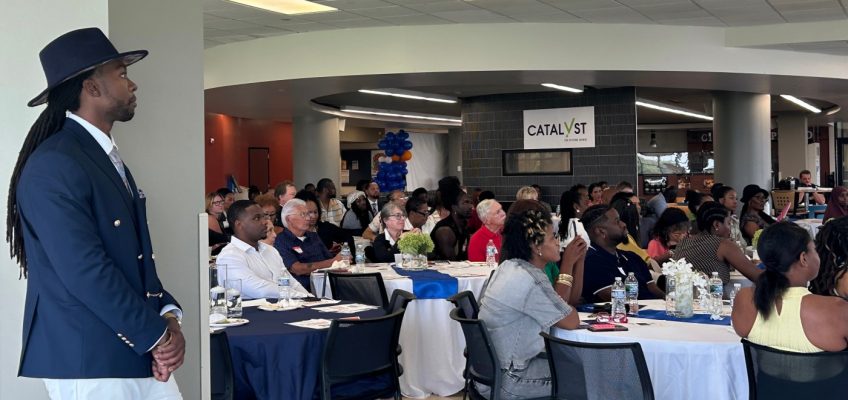Khalique Rogers first met the Center for School Change’s director and founder Joe Nathan when he was in high school.
Now, more than a decade later and after years of work together, Nathan is handing the baton to Rogers. The two have served as co-directors for the organization, with Rogers most recently taking the role as executive director this year.
The nonprofit was founded in 1987 and has focused on identifying, supporting, and implementing solutions for problems in education. It’s supported legislation to bring postsecondary enrollment options to Minnesota – allowing high schoolers to take college courses and earn college credits – as well as charter and alternative schools.
Under Rogers’ leadership, the organization is now called Catalyst for Systems Change and celebrated its official launch Monday.
Holistic approach
It’s an evolution of the work that Rogers and Nathan embarked on together around 13 years ago, when Rogers was a student at Gordon Parks High School in St. Paul, Rogers said. He was taking classes at St. Paul College through the postsecondary enrollment options program, a program that Center for School Change has helped make possible.
“From there, we connected and I started,” Rogers said. “It gave me the opportunity to advocate for more young people to utilize that program, that looked like me, people of color. And then as we continued to work, he asked me, ‘What’s something from your lived experience that you want to work on?’ And I’m like, well, youth homelessness is something I’ve experienced, it’s something I want to find solutions for because I know there’s a better way.”
From there, the two men started a coalition focused on reducing youth homelessness, with work including helping keep a homeless shelter open.
“But it shifted my lens to it because I knew that wasn’t a real solution. It’s like giving someone a fish. So what can we do to create self-sufficiency?” Rogers said.
For Rogers, that means taking a holistic approach, such as getting young people into the workforce and helping them develop skillsets, with a focus on bringing education, housing and workforce development together. The most important people in designing that work are the youth, Rogers said.
Changemakers
Nathan credits Rogers as the mind behind several of the organization’s initiatives with young people, including the organization’s Changemakers Program. Through that program, students are introduced to the legislative process and they work together to decide on the issues most important to them.
Maitreya Reeder, who will be a senior at St. Anthony Village High School in the fall, took part in the program when she and more than 65 youth attended a Changemakers event last November to share what their priorities were for the incoming legislative session. A bill requiring overdose prevention and response education in some classrooms came out on top.
“And we then moved on through sort of a six-month period of lobbying for this bill, meeting with different lawmakers and the writing of different articles to garner support for this piece of legislation as it moved through the Legislature,” Reeder said.
The bill, requiring overdose prevention education as part of health education standards, was unanimously approved by the Minnesota House of Representatives in April and passed during the special session as part of the K-12 education omnibus bill.
“And you can can learn about this stuff from an outside perspective all day in schools — you can talk about it all you want, but there’s truly nothing like being immersed in the actual legislature that will teach you the processes and give you the tools that you need to then potentially do this later in life as a career,” Reeder said.
While Catalyst for Systems Change is not a policy organization, it teaches young people how to be the next generation of leaders, Rogers said.
“So if their vision is to change a policy or it needs that, we have a whole community, so there should be people that can contribute to that,” Rogers said. “And so that’s what we do, is if I’m not the person to do it, well, there are community that have those skill sets, that we can create strategic partnerships to make a difference in the world.”
Related Articles
Domestic violence support groups face ongoing legal battles with Trump, Pa. state budget crisis
St. Paul geothermal heating, cooling projects survive federal cuts
As Nina’s Coffee owner fights cancer, a GoFundMe is raising support
Iraq burn pit activist’s widower to launch book at Woodbury music event
New walking tour showcases Afton’s ‘rich and diverse’ history


Leave a Reply